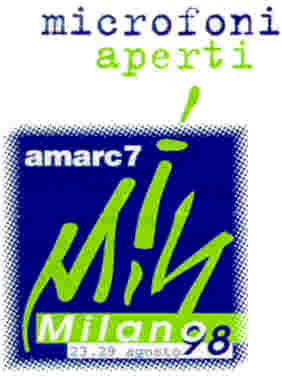amarc-1
[Date Prev][Date Next][Thread Prev][Thread Next][Date Index][Thread Index]
Re: <amarc-1> Intro - Steve Ahern, Australia
Hello all,
My name is Steve Ahern. I am a lecturer at Australia's national
broadcast training institution, the Australian Film TV & Radio School
(AFTRS).
My background is as a radio reporter/announcer/producer in all radio
sectors (community, commercial and public) for over twenty years.
During that time I have been involved in training many community
broadcasters in Australia and other countries and developing training
models. I was manager of several radio stations for the Australian
Broadcasting Corporation for over ten years. Since moving to the AFTRS
I have been involved in a national broadcasting school consultancy in
South Africa and training for the community, commercial and public
sectors here in Australia, so my viewpoint encompasses all sectors and
many countries.
I am interested in issues of access and sustainability in existing and
emerging broadcast technologies and have spoken at various conferences
about my findings on volunteerism, access and new media.
I believe that the two issues of access and sustainability are crucial
to the continuation of democratic media participation. Some thoughts:
ACCESS & TRAINING:
Access and the provision of appropriate training go together.
Providing access alone is not enough to properly empower people to use
the media. Training must be fundamentally linked to access, otherwise
broadcasters will not get their messages across and there will be no
listeners. Skills training can be separated from ideology if properly
taught, so that `training' does not just become 'brainwashing'.
In Australia (and in other countries) we have volunteer fire fighters
and volunteer legal aid lawyers, etc. No one would dream of sending
out volunteer fire fighters or legal aid workers without proper
training - why would we want to do it for radio? So, in my view,
developing appropriate training that does not stifle views, but does
teach people how to communicate via radio, is essential for
empowerment in the sector.
SUSTAINABILITY:
Sustainability of community media is also an important issue. It is
certainly getting cheaper to run radio stations and associated
internet broadcasts for much less cost than in the past - thus
breaking down the access and ongoing barriers that used to require
huge amounts of investment capital - so there are more stations. But
are there more volunteers and contributors? In my view,
sustainability of volunteers is also an important issue to consider in
conjunction with sustainability of the station as an entity. In
countries like Australia there is a strong volunteer sector because
there are social services (like unemployment benefit payments) that
allow you to survive (just!) without paid work, but in many other
countries there are no such social services so volunteerism and the
ability to contribute to community access media is limited, because
people have to put first priority on earning money to survive.
So any lobbying for community media funding should, in my view, take
into account the ability to sustain volunteers with funding of some
kind. Without that, access is not real access, it is just access for
people who can afford it. I also think that Government/NGO funding
should not be the only source of funding for community media and that
there are countries that are developing good models of accessing some
commercial funding without compromising their integrity.
I hope those points are of use in the general discussion.
Ciao,
Steve Ahern
++++++++++++++++++++++++++++++++++
AMARC 7 Foro Virtual Forum Virtuel
http://www.amarc.org/amarc7
to unsubscribe / pour se desabonner / para abandonar :
e-mail "unsubscribe amarc-1 " to: [email protected]
Tecnical realisation, scripting and archiving: Worldcom
Foundation
English: [Virtual
Forum Index] [Search
Forum archives]
Français: [Index
du Forum Virtuel] [Chercher
dans les archives du Forum]
Español: [Índice
del Foro Virtual] [Buscar
en los archivos del Foro]
